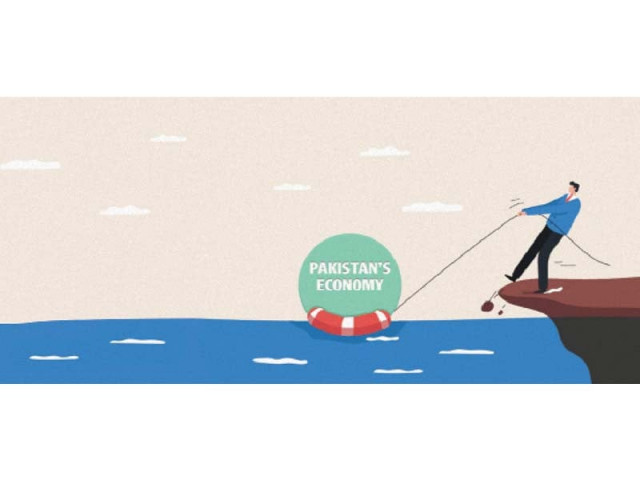PM to chair task force on economy
Some objectives seem contrary to agreement between Pakistan and IMF

Prime Minister (PM) Shehbaz Sharif on Tuesday constituted a task force for economic revival and external sector stability –in a move that may end up recommending measures in conflict with what has been agreed upon with the International Monetary Fund (IMF) for economic stabilisation.
The PM will chair the 20-member task force – half of which is constituted by members from the private sector – majority of whom are already formally and informally advising the government.
An order released by the PM’s office states that, “The prime minister has been pleased to constitute a Task Force on Economy, with immediate effect, to address challenges to the economy through the broad based inclusive economic decision-making and to revive the economy under Prime Minister’s Strategic Roadmap Initiative.”
As chairman of the task force, the PM will now directly be overseeing economic matters and not leaving everything to the finance ministry.
Among the members are Minister for Finance Ishaq Dar, Minister for Planning Ahsan Iqbal, Minister for Commerce Syed Naveed Qamar, Minister of State for Petroleum Dr Mussadiq Malik, Adviser to PM on Establishment Ahad Cheema, SAPM on Government Effectiveness Jehanzeb Khan, governor of the State Bank of Pakistan (SBP), secretary of finance and chairman of the Federal Board of Revenue (FBR).
From the private sector, retired bureaucrat Nasir Mahmood Khosa, Economist Dr Farrukh Saleem, former finance minister Dr Hafeez Ahmed Pasha, CEO Atlas Honda Saquib H Shirazi, Chairman Pakistan Business Council (PBC) Muhammad Aurangzeb, CEO Engro Corporation Ghias Uddin Khan, Arif Habib conglomerate, Chief Operating Officer at JDW Rana Nasim, Agriculturist Aamer Hayat Bhandara, and CEO of Systems Ltd Asif Peer have been inducted.
Some of the objectives of the task force, however, seem to be contrary to the understanding reached between Pakistan and the IMF. The objectives of the task force talk about economic growth and job creation opportunities, which will require the following expansionary fiscal policies.
According to the terms of references (ToR), “The task force will consider policy measures for improving income and employment opportunities and overall economic growth.” Making policies for the revival of economic growth, however, will be challenging given that the IMF has demanded a levy of around Rs600 billion in additional taxes on an annual basis and a significant increase in interest rates – the two steps that will bring the economic wheel to a halt and avoid economic collapse.
At least two objectives of the task force also fall in the areas where the government has already set up a task force or commission working under Minister of State, and Chairman Reforms and Resource Mobilisation Committee, Ashfaq Tola.
According to the terms, the task force will review and suggest measures to ensure fiscal discipline and reduce the expenditure of the government under all heads. Ironically, the National Austerity Committee submitted its recommendations to the government last week and instead of honouring those proposals PM Sharif added seven more special assistants to his cabinet.
The austerity committee had recommended that no cabinet member should use SUVs – none of them, however, have surrendered their luxury vehicles. According to the austerity committee, the recommendations could save the national exchequer at least Rs800 billion.
The task force will also examine measures for revenue enhancement, including progress on the POS scheme to bring the retail sector into the tax net, reviewing real-estate taxation, implementing the Track and Trace System, curbing smuggling, and improving governance.
A Revenue Mobilisation and Reforms Commission is already working to develop a holistic analysis of the country’s taxation regime.
The ToRs further state that the task force will also manage the current account to achieve currency and external sector stability. It will finalise measures for export enhancement and suggest ways to expedite the inflow of potential investment and address the issues impeding foreign investment in the country.
A major obstacle in the way of future foreign investment is a restriction on the outbound flow of remittances and dividends due to the thin foreign exchange reserves position. The central bank is not letting the money go abroad, which has created problems for foreign investors and could even lead to divestment of the existing investments.
The task force will also recommend measures to “expedite the privatisation of public assets”. Prime Minister Shehbaz Sharif has already enacted a new law for the quick disposal of state assets but new legislation has yet to help address the usual bureaucratic and political inefficiencies.
The task force will recommend practical measures for the speedy implementation of energy sector reforms including options to reduce the stock of circular debt and contain its flow. But the federal cabinet just approved a new revised Circular Debt Management Plan, which leaves no room for any further work at this stage.
The task force will also “manage inflation and ensure adequate supply of food and essential commodities”. The inclusion of inflation in the list is contrary to the State Bank of Pakistan Act which gives the absolute mandate of managing inflation to the central bank.
The task force will also propose a roadmap for the development of the IT sector.
Published in The Express Tribune, February 15th, 2023.
Like Business on Facebook, follow @TribuneBiz on Twitter to stay informed and join in the conversation.



















COMMENTS
Comments are moderated and generally will be posted if they are on-topic and not abusive.
For more information, please see our Comments FAQ